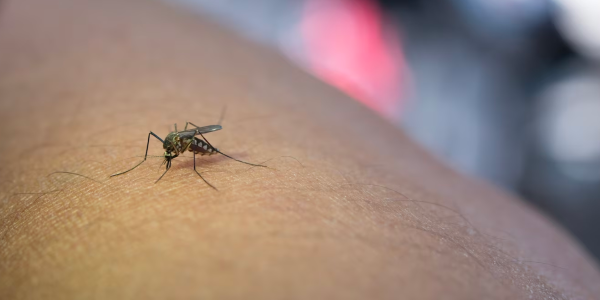Beware! A deadly mosquito-borne disease is silently creeping across Australia
By
VanessaC
- Replies 1
An enemy has re-emerged and is quietly making its way across Australia: the deadly Murray Valley encephalitis (MVE).
It is a deadly mosquito-borne virus that kills about one in five of those who contract it.
Despite it being rare, it is dangerous enough to lead to permanent neurological damage (such as paralysis and brain damage) and even death.
Reports revealed that there is an uptick in cases observed across Australia.
State health agencies have reported an alarming rise in cases in the last 12 months, with two reported deaths in Western Australia this year.
This included a child from the West Kimberley region who died from a bite in March.
NSW Health has reported six cases of MVE this year versus zero cases in 2022, one case in 2021, and zero cases in 2020 and 2019.
For the first time in the past five years, South Australia Health (SA Health) also reported a case of the disease which is characterised by its symptoms of fever, headache, nausea, and vomiting.
Queensland Health has recorded two cases in 2023—their first since 2019.
While Victoria reported its first death from the virus since 1974—a woman in her 60s who unfortunately contracted the virus.
Heavy rains can lead to an increase in mosquito breeding due to flooding, which was the case in South Australia last November 2022 and February 2023 and the Kimberley flood in Western Australia over the New Year.
There is no known treatment yet for this virus. However, SA Health suggested that the best defence is to avoid being bitten at all.
'People should use mosquito repellents containing either DEET, picaridin, or oil of lemon eucalyptus that have been approved by the Australian Pesticides and Veterinary Medicines Authority,' they said.
While the expected El Niño that would bring forth hot and dry weather could reduce the mosquito population in inland Australia, University of South Australia Professor Craig Williams said that the risk in populated areas remains the same.
'The cities are by the sea, so you'll have coastal mosquitoes, which will continue to breed and they are not always driven by rainfall, but their breeding sites can be from tidal action,' Profesor Williams said.
'There's also urban mosquitoes that are in the built-up areas of the city that will continue to do well.'
Other cases of mosquito-borne, which include Ross River and dengue fever, reportedly fluctuate from state to state but tend to be stable or declining.
Mosquito Bite Prevention
In the face of such formidable foes, it is critical to equip ourselves with the best forms of defence. Below are some tips to prevent mosquito bites from happening:
Mosquitoes are predominantly active from dusk till dawn. Planning outdoor activities outside of these hours and staying indoors when their activities peak can help reduce your exposure.
Furthermore, mosquitoes are known to be attracted to dark-coloured and high-contrast objects that’s why it’s important to wear loose-fitting and light-coloured clothing that covers as much of the body as possible.
Also consider installing mosquito screens on windows and doors in your home. If you are camping or sleeping outdoors, a bed net sprayed with insecticide is a must to ensure that your slumber is not disturbed.
If you notice any stagnant water around your residential premises, know that mosquitoes tend to breed in such spaces. Attend to your property by eliminating water sources where mosquitoes can breed. This can include tires, buckets, birdbaths, blocked gutters and other objects collecting rain.
 Members, do you have other tips on how to stay safe from mosquito bites? Share them with us in the comments below!
Members, do you have other tips on how to stay safe from mosquito bites? Share them with us in the comments below!
It is a deadly mosquito-borne virus that kills about one in five of those who contract it.
Despite it being rare, it is dangerous enough to lead to permanent neurological damage (such as paralysis and brain damage) and even death.
Reports revealed that there is an uptick in cases observed across Australia.
State health agencies have reported an alarming rise in cases in the last 12 months, with two reported deaths in Western Australia this year.
This included a child from the West Kimberley region who died from a bite in March.
NSW Health has reported six cases of MVE this year versus zero cases in 2022, one case in 2021, and zero cases in 2020 and 2019.
For the first time in the past five years, South Australia Health (SA Health) also reported a case of the disease which is characterised by its symptoms of fever, headache, nausea, and vomiting.
Queensland Health has recorded two cases in 2023—their first since 2019.
While Victoria reported its first death from the virus since 1974—a woman in her 60s who unfortunately contracted the virus.
Heavy rains can lead to an increase in mosquito breeding due to flooding, which was the case in South Australia last November 2022 and February 2023 and the Kimberley flood in Western Australia over the New Year.
There is no known treatment yet for this virus. However, SA Health suggested that the best defence is to avoid being bitten at all.
'People should use mosquito repellents containing either DEET, picaridin, or oil of lemon eucalyptus that have been approved by the Australian Pesticides and Veterinary Medicines Authority,' they said.
While the expected El Niño that would bring forth hot and dry weather could reduce the mosquito population in inland Australia, University of South Australia Professor Craig Williams said that the risk in populated areas remains the same.
'The cities are by the sea, so you'll have coastal mosquitoes, which will continue to breed and they are not always driven by rainfall, but their breeding sites can be from tidal action,' Profesor Williams said.
'There's also urban mosquitoes that are in the built-up areas of the city that will continue to do well.'
Other cases of mosquito-borne, which include Ross River and dengue fever, reportedly fluctuate from state to state but tend to be stable or declining.
Mosquito Bite Prevention
In the face of such formidable foes, it is critical to equip ourselves with the best forms of defence. Below are some tips to prevent mosquito bites from happening:
Mosquitoes are predominantly active from dusk till dawn. Planning outdoor activities outside of these hours and staying indoors when their activities peak can help reduce your exposure.
Furthermore, mosquitoes are known to be attracted to dark-coloured and high-contrast objects that’s why it’s important to wear loose-fitting and light-coloured clothing that covers as much of the body as possible.
Also consider installing mosquito screens on windows and doors in your home. If you are camping or sleeping outdoors, a bed net sprayed with insecticide is a must to ensure that your slumber is not disturbed.
If you notice any stagnant water around your residential premises, know that mosquitoes tend to breed in such spaces. Attend to your property by eliminating water sources where mosquitoes can breed. This can include tires, buckets, birdbaths, blocked gutters and other objects collecting rain.
Key Takeaways
- The deadly mosquito disease Murray Valley encephalitis is on the rise in Australia.
- State health agencies from Queensland to Western Australia have recorded an increase in cases of the rare but dangerous illness that can lead to permanent neurological damage or death.
- There is no treatment for Murray Valley encephalitis and the best defence is to avoid being bitten, using mosquito repellents containing either DEET, picaridin or oil of lemon eucalyptus that have been approved by the Australian Pesticides and Veterinary Medicines Authority.
- While an expected El Niño weather could reduce the mosquito population in inland Australia, populated areas will likely remain vulnerable due to coastal and urban mosquitoes.








